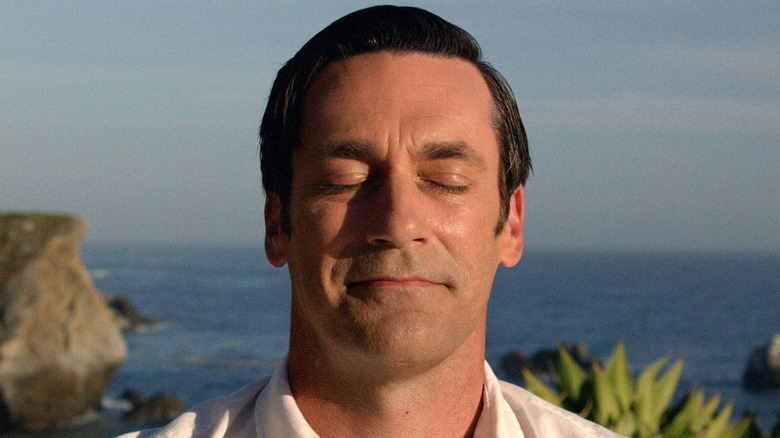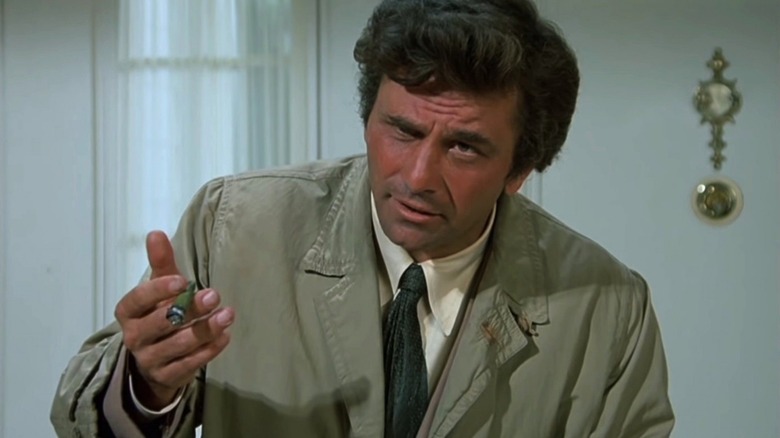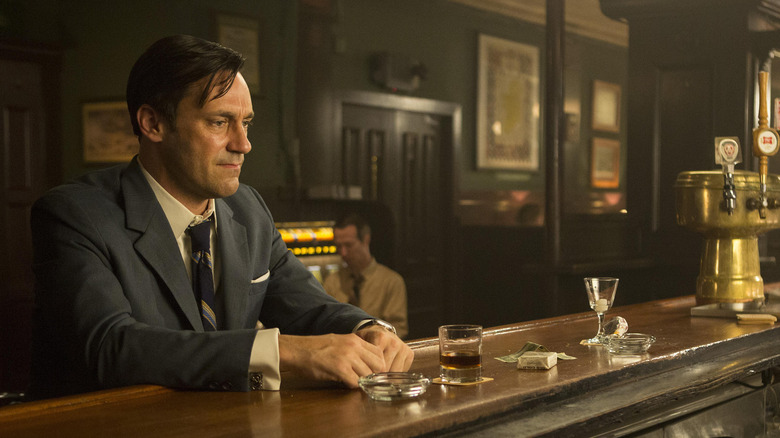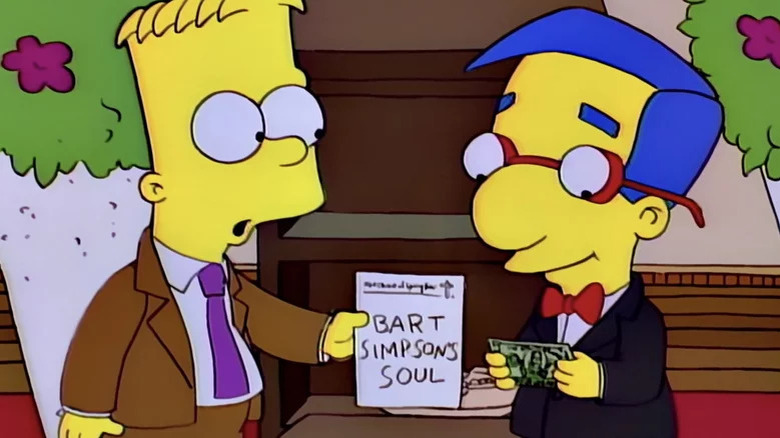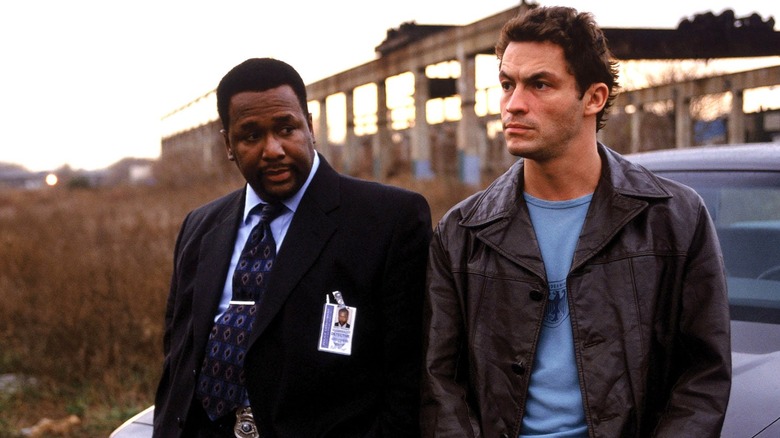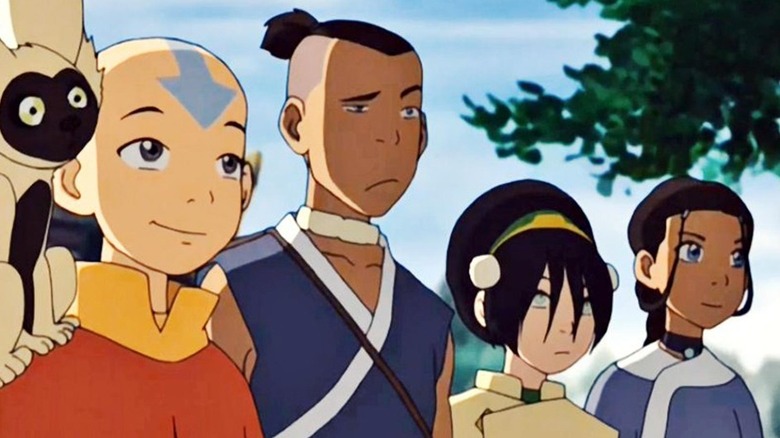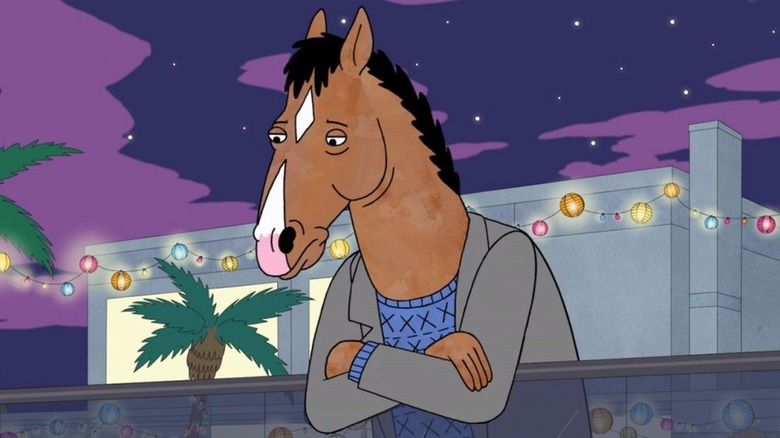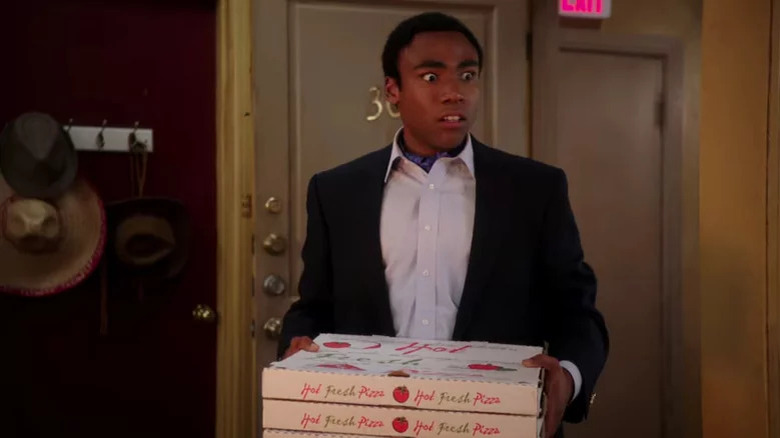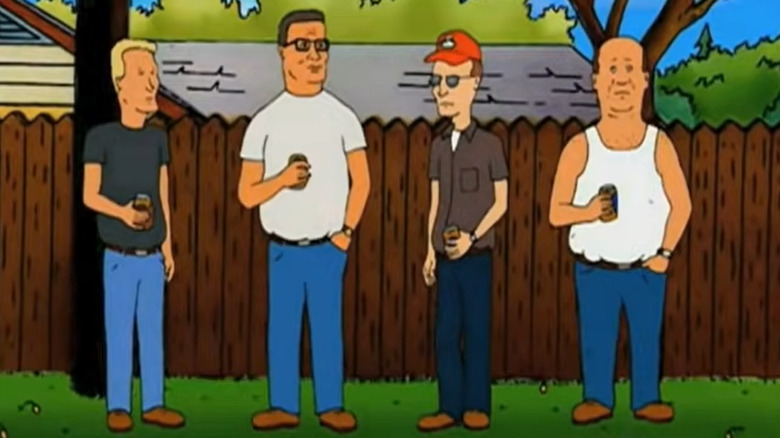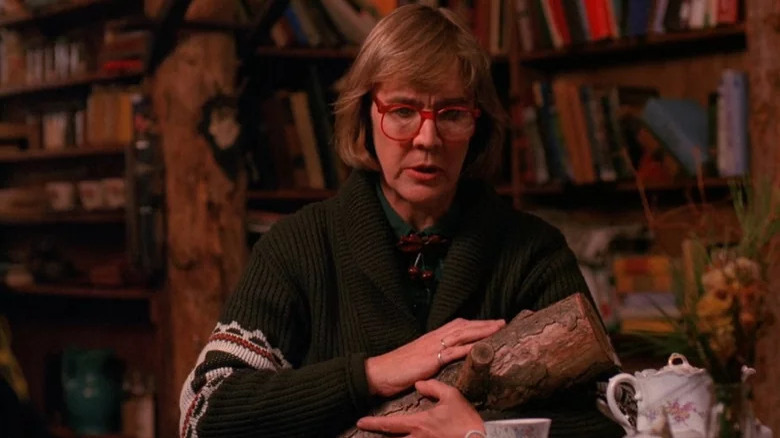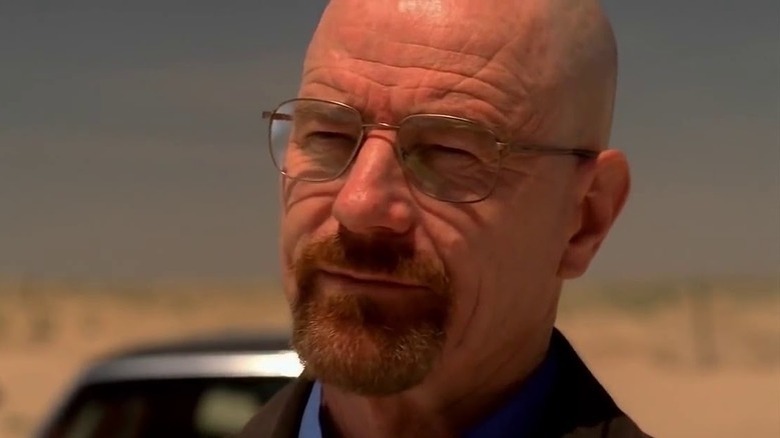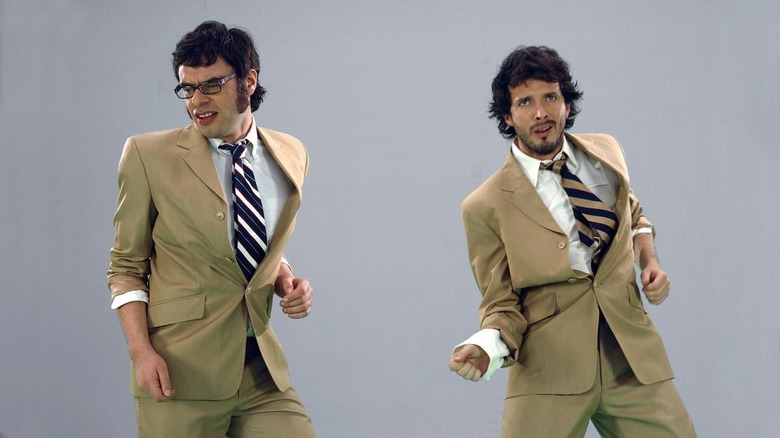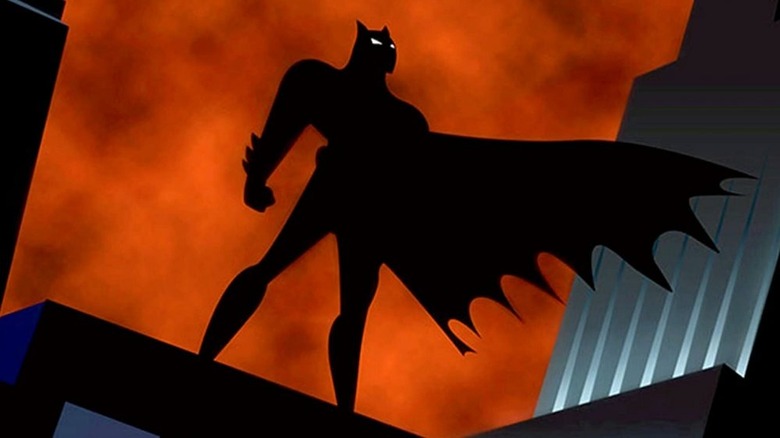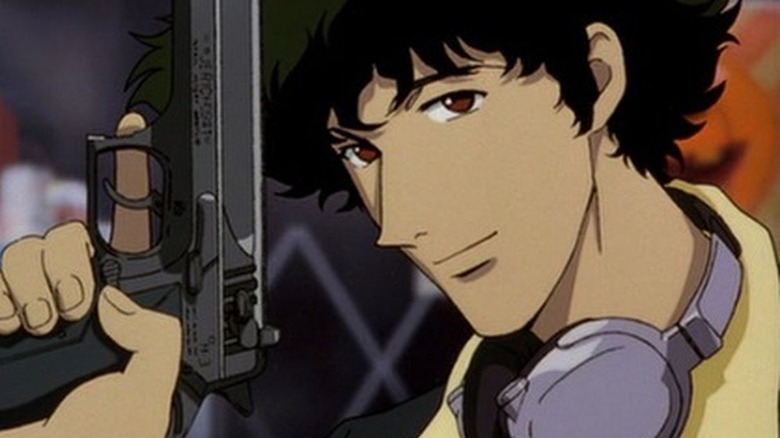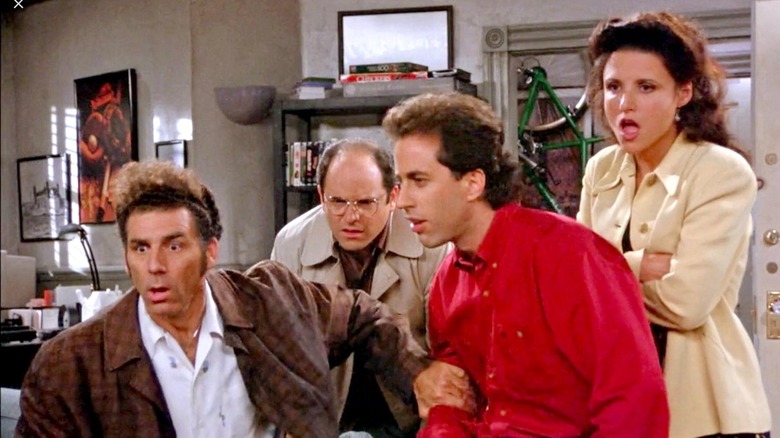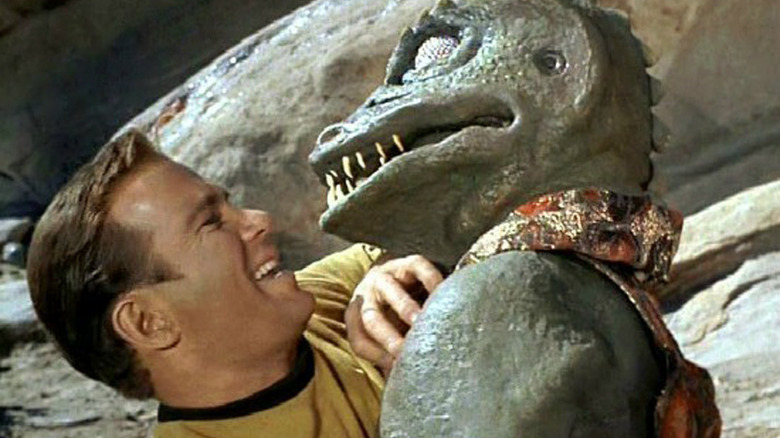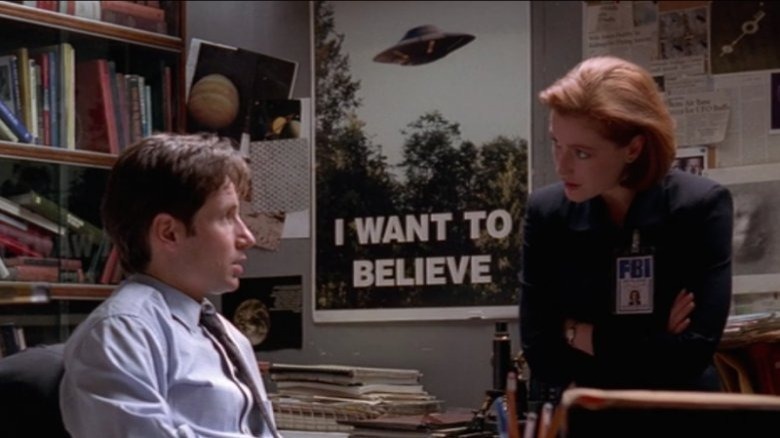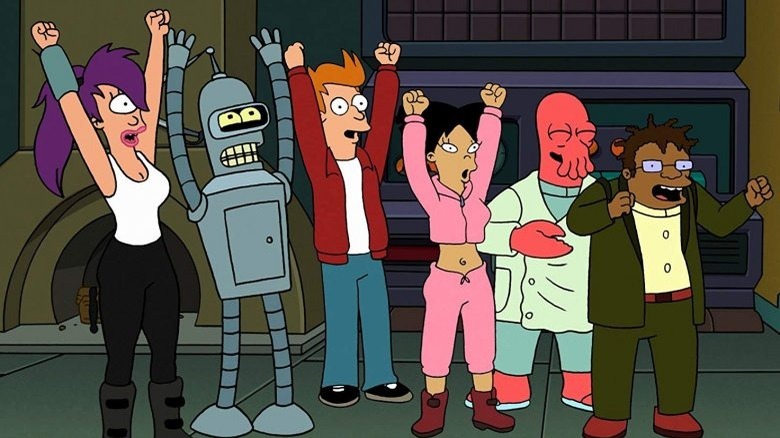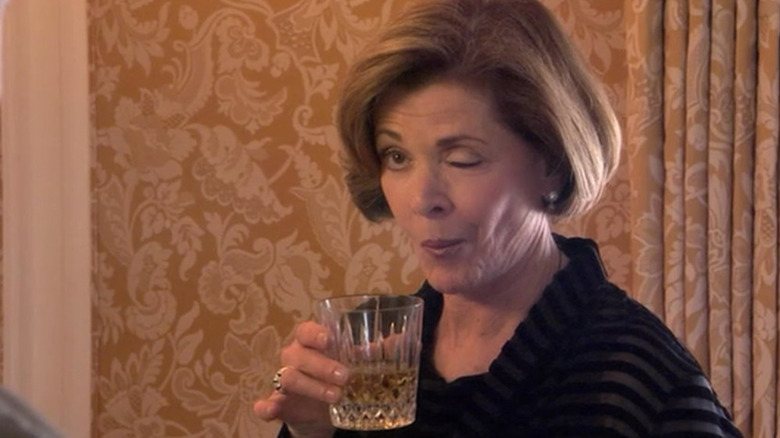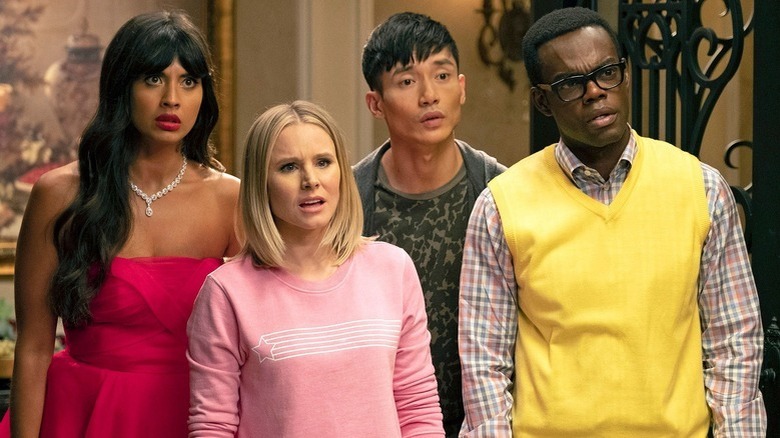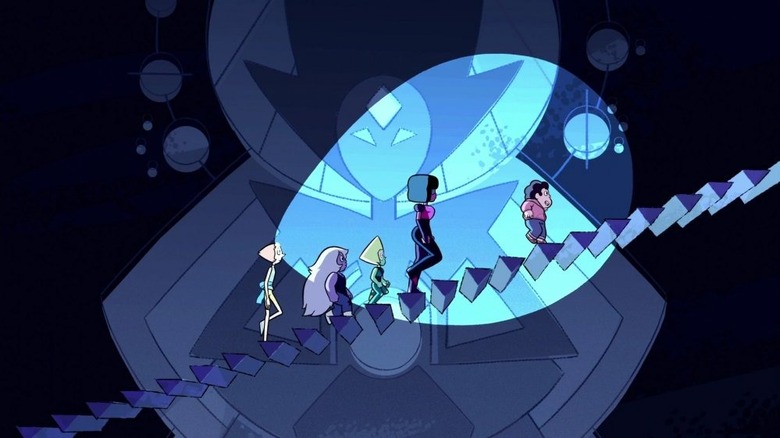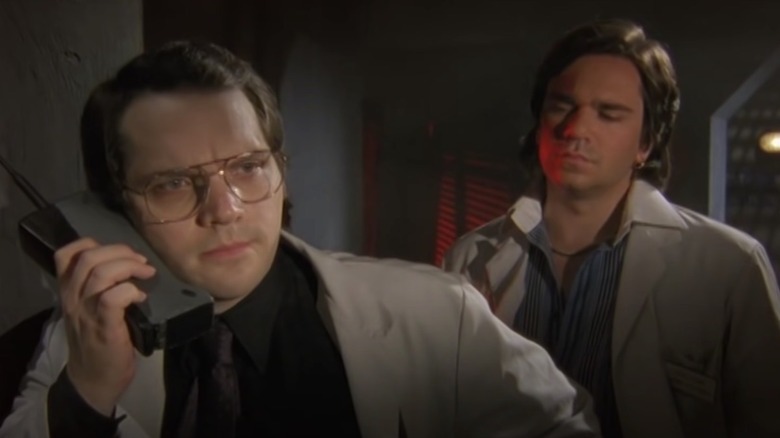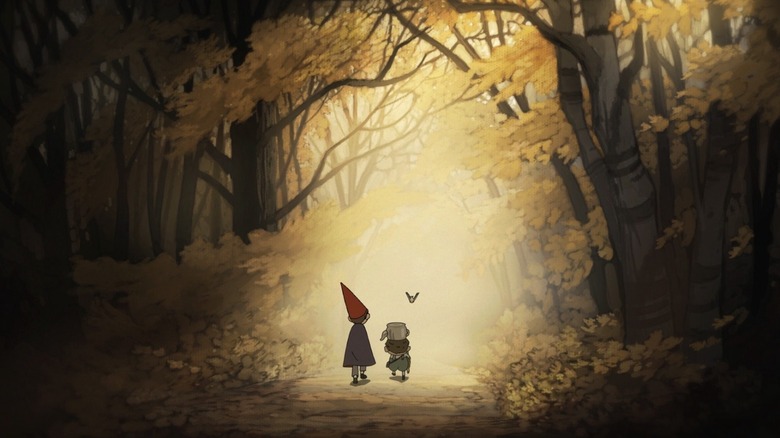The Most Rewatchable TV Series Of All Time
There are plenty of shows that might be amazing to watch the first time around, but don't have much to offer upon repeat viewings. But there's also another, rarer breed of show: the show that grows on you. The more you watch it, the better it gets. Then you finish it, so you start over again at the beginning, and now, somehow, it's even better?
Some of these shows are rewatchable because of their complex plotting, like a puzzle that you appreciate in a new way once you've assembled all its pieces. Others are oddities that require multiple viewings in order to fully digest. And some are just plain cozy, fun shows with reliable formulas that are easy to put on in the background pretty much whenever. There are even a few shows that check all three of these boxes.
This is a list of those special shows that only get better with time, no matter why we love rewatching them. They're like a fine wine, but... an infinite bottle of wine that you can keep drinking forever. Hmmm, this analogy got away from us a little bit. Let's just get to our choices.
Columbo
The detective series "Columbo" is famous for breaking all the normal rules of the murder mystery genre. In fact, most of the stories aren't technically "mysteries" at all. Most episodes begin by showing the murderer of the week executing their crime and seemingly getting away with it. By the time our ostensible protagonist, Lieutenant Columbo (Peter Falk), arrives on the scene, it's sometimes over 20 minutes into the episode.
Our titular detective is also quite unusual. With messy hair and a rumpled coat, Columbo seems less like Sherlock Holmes and more like your weird uncle. And from here, the rest of the story unfolds in a surprisingly low-key fashion. There are no shootouts or car chases. Rarely does a character even raise their voice. Mostly, it's just a series of conversations between Columbo and the murderer, as he picks at the seams of their story until finally he discovers a contradiction that reveals the truth. Despite his unassuming appearance, Columbo is relentless, perceptive, and highly intelligent.
There's something profoundly comforting about "Columbo," which makes it a perfect show to rewatch. Perhaps it's because of the reliability of the show's formula, or the unhurried nature of the writing. It could be the guest stars, which consist of pretty much every 1970s celebrity you can think of, including William Shatner, as well as icons like Vincent Price, Janet Leigh, and even Johnny Cash. Or perhaps it's an inevitable byproduct of the show's core conceit. After all, if you know who the killer the whole time, even the first time you watch it, it's not like there's anything that gets spoiled the second time around.
Mad Men
Equal parts beautiful and nihilistic, "Mad Men" is not only one of the greatest television shows of all time, but also one of the most rewatchable. The series tells the story of an advertising agency in the 1960s and the massive web of people that work there. At the center of this web is Don Draper (Jon Hamm), the firm's creative director. On the outside, Don appears to have the perfect life. He's rich, he's handsome, and he has a loving wife and two children. However, beneath the surface, Don's life is anything but ideal. Plagued by mental illness and haunted by ghosts of his past, Don indulges in a wide array of vices to numb his pain, as he tries in vain to chase the happiness that he promises others in the hollow ad copy he writes.
The first time you watch "Mad Men," it's full of shocking surprises — including a certain bombshell of a dark secret in Don's past. The second time you watch it, it's like watching a car crash in slow motion. You're seeing loveless marriages that you know will soon collapse in a couple of years, meeting fresh-faced new hires that you know will grow into jaded veterans, and seeing small decisions that you know will come back in later seasons with dire consequences. You're seeing someone finally achieve their lifelong dream, now with the knowledge that it won't actually make them happy, at least not in any way that truly lasts. Grim, sure, but there's plenty of humor and detailed set design to leaven the experience.
The Simpsons
In more ways than one, "The Simpsons" is a show that you can just keep watching forever. First of all, there's just so much of it. "The Simpsons" holds countless world records for longevity, including longest-running American sitcom, longest-running primetime scripted series, and longest-running American animated series. But beyond just the sheer number of episodes that exist, "The Simpsons" is also, without a doubt, one of the best-crafted TV shows in history, especially during the show's first decade or so.
First premiering in 1989, "The Simpsons" was initially conceived as a reaction to the largely toothless and sentimental sitcoms of the 1980s. Unlike the Keatons from "Family Ties" or the Tanners from "Full House," the Simpsons are a deeply flawed family unit. Despite its cynical edge, the show still had an enormous amount of heart, not to mention top-notch humor that blended clever satire, stupid slapstick, and pure absurdity.
Fans disagree with one another about when exactly the golden age of the show truly ends and the quality starts to decline, but the good news is that whenever you reach the point in your latest rewatch that the show stops feeling like the show you love, you can just start over again at the beginning. Because even if you cut out the bad seasons, there are still probably way more great episodes of "The Simpsons" than of any other show you love to rewatch.
The Twilight Zone
During the 1950s, television writer Rod Serling was frustrated with the limits of writing for network television. He was stating in interviews that he wanted to write television that spoke to the important social issues of his day. However, his networks were often skittish around hot-button issues, and they would frequently water down his stories until they no longer had anything to say. His ultimate solution to these problems was the series that ended up being his magnum opus: "The Twilight Zone."
"The Twilight Zone" is a science fiction anthology show — or perhaps it's more accurate to say that it's the science fiction anthology show. The series is widely regarded as one of the best television shows of all time, full of memorable characters, masterful plotting, and of course, truly killer twist endings. And beyond that, the show was able to achieve Serling's goals of engaging with important issues of his time, because it's much easier to sell stories about racism, nationalism, and war if you pretend that they're stories about aliens, robots, and other worlds. Even though this is a show from the '50s and '60s, for the most part, these stories are just as entertaining — and, sadly, relevant — today as they were back when they were first written.
Even though you've probably had some of the twist endings spoiled for you just by existing on planet Earth, don't worry. Most episodes of "The Twilight Zone" simply get better the more you rewatch them.
The Wire
Since the invention of television, there's never been a shortage of television shows about police officers. However, many cop shows from previous decades do not hold up particularly well to rewatching, largely due to an overly simplistic view of crime and policing. "The Wire," on the other hand, is only getting better with age.
Set in Baltimore, Maryland, the series follows a vast cast of characters consisting of both police officers and criminals. It portrays both types of people with empathy and humanity. The series is not at all afraid to show how inadequate the police force can be at stopping the root causes of crime, or how all people —cop and criminal alike — are products of the world they grow up in. People are often only able to be as good as their circumstances allow. The series was based on writer David Simon's time as a crime reporter for the Baltimore Sun, lending it a gritty social realism that's hard to come by on TV.
With an amazing ensemble cast of actors like Dominic West, Idris Elba, Michael B. Jordan, and of course Michael K. Williams as the iconic Omar Little, "The Wire" is an intelligent and often darkly hilarious story of human beings trying to do their best in a world where there are no easy answers. As you watch it, you'll slowly realize that pretty much every prestige drama that has been created since has been trying to be "The Wire," and when you rewatch it, you'll realize that nearly all of them have failed.
Avatar: The Last Airbender
At first, "Avatar: The Last Airbender" may seem like a collection of fairly standard fantasy tropes. It is a world of four nations, each aligned to a classical element: earth, fire, water, and air. Certain people in each nation are born with the innate ability to "bend" their element. Additionally, once per generation, an "Avatar" is born, one who can command all four elements, and who is supposed to keep peace among the nations. But when our story begins, the Avatar has been missing for a century, and one of the nations, the militaristic Fire Nation, has conquered almost the entire world. Then, a pair of kids find the Avatar frozen in ice, preserved in magical stasis. They then set him free and discover that he is also just a kid, just about their age. Though the odds against them are insurmountable, they decide to help their new friend on a journey to master all four elements and free the world.
Despite seeming somewhat simple at first, by the end "Avatar: The Last Airbender" ends up being a transcendent experience. The setting is deep and lovingly crafted, the characters are all extraordinarily charming and multifaceted, and the animation in the action scenes is breathtakingly beautiful. Over the course of three seasons, this eclectic band of misfits grows up into epic world-saving heroes, resulting in one of the most satisfying serialized long-term stories ever seen on television, one that is very much worthy of revisiting over and over again.
Bojack Horseman
When "Bojack Horseman" first premiered in 2014, it received only middling reviews. It seemed likely that the show was going to be remembered as yet another example of crude, cynical, and ultimately forgettable piece of adult animation, one with all shock and no substance. But as the show continued, season after season, something surprising began to happen. It started to get good — mind-blowingly good.
Somehow, this silly little cartoon about a washed-up alcoholic celebrity horse evolved into a fascinating meditation on the nature of addiction, depression, and self-destructive behavior. It also started to get quite experimental at times, with artsy high-concept episodes like "Fish Out of Water" and "Free Churro." By the time the show arrived at its sixth and final season, it had become one of the smartest and most well-crafted shows in television history. Yes, we are still talking about the dirty cartoon with the alcoholic horse.
And now that the show has concluded, we can confirm that as good as "Bojack Horseman" was the first time around, it's even better during a rewatch. Even the earlier and more jokey episodes hit with an additional undercurrent of melancholy now that you know where the show is ultimately heading. Once you pass the halfway point, it's pure bliss until the end. Well actually, it's horrifically depressing, but you know what we mean. The point is, "Bojack" has always been good. Back in 2014, we were all just too burnt out on bad adult cartoons to notice.
Community
Greendale Community College attracts people from all walks of life. There's Jeff, a manipulative former lawyer who was disbarred after it was discovered that he lied about having a bachelor's degree. There's Troy, the football star who lost his scholarship after he injured himself trying to do a keg stand. Then there's Shirley, a middle-aged divorcée who is studying business in order to start her own baked goods company. The ensemble cast sitcom "Community" tells the story of all these people, plus three more, who end up forming an unlikely study group that soon evolves into an unlikely friend group.
On one level, "Community" has a relatively straightforward premise. But just describing that premise will give you no idea of what the actual experience of watching "Community" is truly like. One episode will be all about a game of paintball, and it's filmed just like a war movie. In another episode, the group plays a video game together, and the characters are all animated pixel art. And in another classic episode, the group orders pizza, and when it arrives, they roll a die to see which of the six of them should go retrieve it. From there, we explore six different versions of the same evening across six different parallel realities, based on which one of the six picked up the pizza, including a certain timeline in which things get extremely dark.
Smart, inventive, and funny as hell, episodes of "Community" are just like its characters: varied, complex, and at times off-puttingly weird, but you love them anyway, both despite and because of their strangeness.
King of the Hill
"King of the Hill" is a show that sneaks up on you. It's not at all thrilling or fantastical, especially by the standards of most cartoons. Instead, the show focuses on the relatively mundane lives of the inhabitants of the fictional Arlen, Texas. You might not get it at first. The colors are muted, most characters speak in somewhat monotone voices, and what humor there is tends to be rather dry. But after a few episodes, you'll start to get on the show's extremely weird wavelength, and that is a wonderful place to be.
The main thing you'll come to love about the show is its absolutely killer cast of characters. There's the old-fashioned and good-hearted Hank Hill, Hank's goofy and decidedly un-masculine son Bobby, their paranoid conspiracy theorist neighbor Dale, and dozens more. All are deeply strange, and yet somehow, all of them feel far more real than the vast majority of characters you'll see in any television show, animated or otherwise. And similarly, although the plots do often end up in rather zany places, the show always has one foot firmly planted in reality. The end result is a unique and almost uncanny tone that's unlike anything else on TV. Like drinking a strong cup of coffee, "King of the Hill" might be a bit alienating if you're not used to it, but once you develop a taste for it, there's nothing else like it.
Twin Peaks
Even if you've never any of the work of David Lynch, you probably recognize his name as "the guy who makes the really weird movies." And you'd be right, he is the guy who makes the really weird movies! But, in the early '90s, he was also the guy who made a really weird TV show. "Twin Peaks" might not seem all that strange when you first start watching it, but give it time, it will get there — and then it will keep on going to places that are far stranger.
The show is a sort of police procedural meets soap opera set in a small town in Washington. After a local teenage girl, Laura Palmer, turns up dead under strange circumstances, a big-city FBI agent named Dale Cooper shows up to investigate. From there, both Dale and the audience get to know all the various inhabitants of Twin Peaks, all their quirks and all their dark secrets. The characters range from hilarious and tragic to mundane and surreal. It's a mystery show, and yet with each revelation, you feel like you know less, and that's OK. Part of the power of "Twin Peaks" is that it's an experience that you never fully understand, no matter how many times you've seen it. We'd explain more, but in some ways, "Twin Peaks" cannot be explained. It can only be experienced.
Breaking Bad
"Breaking Bad" begins on the 50th birthday of Walter White (Bryan Cranston), a man whose life is... fine. Sure, he's got problems. Money is a little tight, but other than that, he's happy, right? Well, all the small problems in Walter's life suddenly get much bigger when he is diagnosed with cancer and learns that he has, at most, a handful of years to live. Suddenly, Walter needs to make some money fast to leave something behind for his family. Given that he knows chemistry, and he has nothing left to lose, he decides that the best way to get rich fast is by making meth. As this dorky science teacher slips down further into a world of violent criminals, he discovers, to his surprise, that he can be just as bad as they are. Not only that, but this new world is everything that has been missing from his life. It's dynamic, it's challenging, and people respect him.
From the writing to the cinematography to the incredible acting, "Breaking Bad" is just about perfect. Walt's slow journey from sweet family man to ruthless criminal kingpin is one of the greatest sagas ever put on film, full of mind-blowing twists, dark comedy, and heartbreaking tragedy. If you haven't seen it before, there's probably at least one friend in your life who has been begging you to watch it. For once, you should listen to that friend. And if you need someone to watch it with, ask them. They probably won't mind rewatching it.
Flight of the Conchords
Just like your favorite pop song, any time is a good time to put on some "Flight of the Conchords." This sitcom follows Bret McKenzie and Jemaine Clement, fictionalized versions of a real two-man band from New Zealand. The pair travels to New York City to make it big in the music biz. However, it turns out that the market for guitar-based digi-bongo a capella-rap-funk-comedy music is surprisingly small, so they find themselves performing to mostly empty rooms in small bars and coffee shops. In between gigs, they go on dates, work part-time jobs, and try to avoid the attention of the one fan they've managed to attract so far, the obsessive and borderline stalker-ish Mel (Kristen Schaal). A couple of times each episode, the show will break from its normal sitcom format for an impromptu musical number, in which Bret and Jemaine perform a sort of surreal music video inspired by the situation they find themselves in.
"Flight of the Conchords" is a true delight, with a stellar cast and unique off-kilter energy. It's funny, touching, and sometimes even a bit deep. If that's not enough of a selling point, the show even has a few episodes that were written and directed by Clement's longtime friend and collaborator Taika Waititi, years before he made "Thor: Ragnarok." And even if you only watch it once, the show's wonderfully catchy soundtrack will probably stick in your brain and never leave.
Batman: The Animated Series
There have been many adaptations of Batman over the years, from the campy '60s TV show, to the slightly less campy Burton/Schumacher era, to the dark and gritty Nolan films. Everyone has their favorite version of the Dark Knight, but many fans agree that "Batman: The Animated Series" might just be the definitive adaptation. The show features Kevin Conroy as Batman and Mark Hamill as the Joker, both of whom have gone on to become arguably the most iconic portrayals of both characters. It adapted classic characters and stories straight from the comics and created plenty of new ones. It also found an almost perfect balance between the darker and the lighter sides of Batman fiction — appropriate for kids and engaging for adults.
Not only did this show regularly equal the level of quality of the comics it was adapting from, at times it even outshone the source material with some of its changes and addition — so much so that DC then incorporated ideas from the cartoon back into the comics, an almost unheard of feat at that time. The show redesigned the look of characters like Mr. Freeze and Two-Face. It revitalized forgotten joke characters like Clayface and Clock King. Oh, and by the way, this show also invented Harley Quinn and Renee Montoya (also Condiment King, if anyone cares about him).
Whether you watched it as a kid or not, do yourself a favor and go watch, or rewatch, "Batman: The Animated Series." There's a reason that this particular version of the Dark Knight casts such a long shadow.
Cowboy Bebop
Considered by many to be one of the greatest anime series of all time, "Cowboy Bebop" is also perhaps the most rewatchable. Set in a lawless future, it follows the adventures of a team of eclectic bounty hunters struggling to make ends meet. Although it's always extremely well-crafted, "Cowboy Bebop" is also somewhat difficult to pin down in terms of its genre. One moment, it's a lighthearted comedy; the next, it's a thrilling action series. Then it will sprinkle in a bit of brainy, philosophical sci-fi, before shifting once again into a brutal, violent neo-noir.
Perhaps this is why, despite the show's science-fiction premise, it always feels so real: just like life, it has no respect for genre conventions. Adding to this sense of realism is the amazing cast of characters. There's the low-key and reluctantly heroic Spike Spiegel, the gruff and world-weary Jet Black, the arrogant and sarcastic Faye Valentine, and the chipper child prodigy Edward. You feel like you know them instantly, and yet, no matter how much you see of them, you always feel as though parts of them are hidden in shadow.
The only bad thing about "Cowboy Bebop" is just how little of it there is. There are only 26 episodes, and because how the story seems to begin in the middle and end before all the loose ends are tied up, it feels much bigger than it actually is, like these stories are just the middle of a much larger epic. Each time you finish "Cowboy Bebop," you'll be left feeling like there's more of it out there, and feel compelled to watch it again.
Seinfeld
Without a doubt, one of the most endlessly rewatchable genres of television has to be the sitcom. Your favorite might be "Friends," "The Office," or "Frasier," but today, we're going to talk about "Seinfeld." The show chronicles the misadventures of four friends living in New York City. There is the detached and persnickety Jerry, the insecure and amoral George, the bold and belligerent Elaine, and the superlatively strange Kramer.
"Seinfeld" often bills itself as being a "show about nothing," and that's certainly true, at least for the first few seasons, with an episode about waiting for a table in a Chinese restaurant or being unable to find your car in a parking garage (these mundane episodes are arguably some of the best). As the show continues, the storylines become increasingly and wonderfully surreal. Kramer reassembles the set of the Merv Griffin show inside his apartment. Jerry stumbles into the world of illegal underground cockfighting. There's even an episode in which the scenes are all shown in reverse chronological order, three years before "Memento."
The thing you appreciate most when you're rewatching "Seinfeld" is how complex it is. Unlike most sitcoms, which cut back and forth between an A plot and an unrelated B plot, "Seinfeld" episodes typically have three or four plotlines, all of which are interwoven and constantly bouncing off each other, before ending in a climax in which all the various plot threads collide in a funny finale. In some ways, "Seinfeld" plots are less like a traditional story and more like math, or perhaps architecture. It's all the grandiosity and complexity of a heist film, but serving a story about some jerk trying to get a discount at the eye doctor.
Star Trek
You can't have a conversation about rewatchability without bringing up "Star Trek." There have been 11 different series of this unparalleled science-fiction juggernaut since 1966, with a grand total of 821 episodes across 40 seasons of television!
The first iteration, now called "The Original Series," tells the tale of the crew of the Starship Enterprise, exploring space and providing humanitarian assistance to those in need on behalf of the United Federation of Planets. In addition to having iconic characters and excellent sci-fi storytelling, the show was also groundbreaking in how it strove to paint an optimistic picture of a future that could be, and should be. It was one of the first pieces of pop culture to have what we now think of as a modern fandom: a group of people that rewatch, discuss, and create fan works based on something they love.
As our own modern times feel increasingly chaotic and uncertain, it feels nice to spend some time in "Star Trek's" hopeful vision of the future, one in which people are able to set aside their differences to figure things out together. Whether you prefer the epic scope of "The Next Generation," the darker and more complex "Deep Space Nine," or the full-on comedy "Lower Decks," there's no wrong way to love "Trek."
The X-Files
Like many classic buddy cop stories, "The X-Files" is centered on an unlikely partnership. Agent Fox Mulder (David Duchovny) is an FBI profiler with a strong belief in the paranormal. Agent Dana Scully (Gillian Anderson) is a coldly rational medical doctor and a diehard skeptic when it comes to anything spooky. In the series premiere, the two are paired up and assigned to a little-known department of the FBI known as the X-Files, which handles cases that involve claims of the paranormal or other unexplained phenomena. Then, over the course of the series, Mulder and Scully alternate between investigating strange one-off monster of the week oddities and uncovering the truth behind a much larger conspiracy regarding a shadowy force that is abducting and experimenting on humans, which might be aliens, might be the US government, or both.
There's a lot to love about "The X-Files," but without a doubt, its single strongest asset has to be its two leads. Mulder and Scully are a perfect pairing, and always play off each other wonderfully, both dramatically and comedically. Not to mention that, by the end of the series, their initially incongruous partnership ends up evolving into one of the best slow burn "will they or won't they" relationships in television history. That said, not every episode is great. There are some genuine stinkers in there, so during your next rewatch, we won't blame you if you decide to skip a couple of your least favorite episodes... or seasons.
Futurama
It's not often that a creator makes a show that is worthy of endlessly rewatching, and in that regard, Matt Groening is a true outlier, because he's achieved this twice: first when he created "The Simpsons," and again a decade later when he created the science fiction comedy "Futurama."
On a surface level, "Futurama" works extremely well as a somewhat absurdist gag-driven sitcom, but there's also a lot to appreciate about it during repeat viewings. In addition to the more obvious jokes, the show is also packed with countless subtle background gags. You can pretty much guarantee that any time there's a sign in the background, it's going to have some sort of terrible pun. Additionally, a surprising amount of the show's humor is fueled by fairly in-depth explorations of scientific concepts like quantum mechanics and the gray goo scenario. There's even an entire episode built around the idea of a time machine that can't violate the laws of thermodynamics, so it only goes forward in time.
If that's not enough, the creators invented two secret "alien languages" — which are in fact language ciphers — that they use to hide additional jokes throughout the show. So, you can also watch "Futurama" with a pad of paper and a pencil, and try to figure out the secret bonus jokes only for true fans. Y'know, if you're that kind of nerd.
Arrested Development
The delightfully odd ensemble cast sitcom "Arrested Development" tells the tale of the tumultuous lives of the Bluths, a family of wealthy real estate developers who fall on hard times when the patriarch of the family is arrested for assorted criminal activities. (Get it, "Arrested Development?") From there, their personal lives begin to deteriorate, and the plot grows increasingly absurd as the Bluths attempt all sorts of schemes to regain their wealth, avoid prison, and hold onto what little dignity they have left.
Though critically acclaimed when it first premiered, "Arrested Development" never managed to attract a large audience during in initial run on television. Some point the blame at the fact that, for a sitcom of that time, the show had a surprisingly complex continuity, and many of the jokes were based on recurring bits that would repeat and evolve over the course of the series, making it a difficult show to just watch a single random episode of without context. But fortunately, all the things that repelled new viewers when it was airing live make it the perfect show to binge on streaming services. Fans are divided as to whether or not the two later revival seasons are worth watching, but you should at least check out the initial three seasons, and then probably watch them again. "Arrested Development" is the rare show that just keeps getting funnier the more you see it.
The Good Place
"The Good Place" is a one-of-a-kind fantasy drama sitcom that premiered in 2016. Despite how recently this show aired, it can stand confidently beside classics of the past as one of the greatest TV shows of all time. In the first episode, a woman named discovers that she has died and that she is in heaven, or, as they call it, "The Good Place." There's just one problem: Eleanor knows she was a terrible person, and she has reason to believe that she was sent to "The Good Place" by mistake. With the help of some new friends — some of whom she suspects also don't belong here — Eleanor tries to hide the truth about who she really is, while also working to become a better person, someone who actually deserves what she has unjustly inherited.
Many sitcoms struggle to balance their funny bits with the serious bits, but "The Good Place" is always masterfully mixing these two flavors without either losing their kick. It will present a lecture about philosophy that is gut-bustingly hilarious. It will make a dumb sex joke that is sublime and beautiful. "The Good Place" is not just one of the funniest shows ever, its exploration of the nature of morality and the meaning of life might legitimately change your outlook on the world. And after you've finished your time through, rewatching it is simply heavenly.
Steven Universe
"Steven Universe" tells the tale of, well, Steven Universe — the half-human, half-alien son of an otherworldly being named Rose Quartz. In years past, Rose saved the world leading a team of magical superheroes called "The Crystal Gems." However, Rose passed away while giving birth to Steven, so he ended up being raised by the rest of her team: Garnet, Amethyst, and Pearl. When the show begins, Steven starts to manifest some of Rose's powers, and the others decide to start teaching him how to be a hero.
"Steven Universe" initially presents itself as a straightforward action-comedy cartoon, but as the show progresses, it starts subverting its usual formula in increasingly large ways. By the time you reach the end, it's become something entirely different. We eventually realize that pretty much everything that Steven believes at the start of the show is a lie, including the true history of the Crystal Gems, the nature of the monsters they hunt, and the shocking truth about his mother.
With a truly unique and fascinating setting, "Steven Universe" is perhaps the best example ever of how to slowly reveal and expand a complex science fiction setting without it ever getting overwhelming or subjecting the viewers to an unwanted exposition dump. Also, when you rewatch the show, it soon becomes clear that, from the very beginning, the show is full of clues about the many plot twists we get in later seasons. You'll never notice them the first time around, but during a rewatch, your jaw will constantly be on the floor because of how masterfully the show foreshadows all of its big moments.
Garth Marenghi's Darkplace
Now for a bit of a wild card pick: the most obscure show we're discussing today is the 2004 British comedy horror series "Garth Marenghi's Darkplace." The character of Garth Marenghi, played by Matthew Holness, is a self-described "dreamweaver," a parody of someone like Stephen King or Clive Barker, with none of the talent and all of the ego. He is our host, presenting to us a television horror television series that he allegedly created back in the 1980s, but that was never released. Marenghi is clearly an enormous fan of himself, and really toots his own horn about how great this show is.
We then go on to watch episodes of "Darkplace," interspersed with documentary-style interviews with the show's in-universe creators, and everything about this ostensibly scary show is ludicrously, hilariously bad. The writing, the acting, the sets, the props, the camera framing, the soundtrack: all of it is being painfully and precisely incorrect at every turn, in the style of the worst B movies.
You might not like "Garth Marenghi's Darkplace" the first time you watch it; many people don't. You honestly have to build up a tolerance to how intentionally off-putting it is at every turn. But once you get on this show's level, you'll come to realize that it's one of the funniest parodies ever created, and you'll definitely want to rewatch it with your friends.
Over the Garden Wall
Unlike some of these epic and lengthy sagas we're covering today, this next little show is just a single season long, comprised of 10 eleven-minute shorts. You can knock it out in under two hours if you binge it. But despite its brevity, it's also just as worthy of watching and rewatching as anything else we've discussed thus far.
"Over the Garden Wall" is an animated miniseries that follows the journey of two half-brothers, Wirt and Gregory. The pair find themselves wandering about a haunted autumnal forest known as the Unknown. They can't quite remember how they got there. All they know is that they need to get home. Their journey contains elements of comedy, drama, adventure, and horror, seamlessly sliding from one to the next like an old uncensored folktale that was written before the various storytelling genres all got split up and sanitized. Wirt and Gregory wander into a town full of pumpkin people performing a harvest festival, they stow aboard a riverboat full of humanoid frogs, and they keep running into a mysterious woodcutter who warns them about a creature he calls "The Beast."
It's a beautiful little gem of a show that spooky kids and adults can watch together. There's also a bit of a mystery at the heart of the show as well, and once you know the answers to what is really going on, the show gains a great deal of depth and poignancy during a rewatch. Like a classic fairy tale you never get tired of hearing, try rewatching this one each year as the leaves begin to change. It just might become your new favorite fall tradition.
